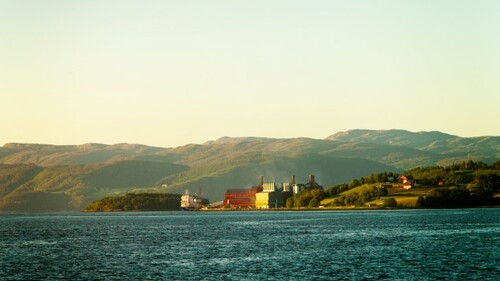WACKER replaces fossil coal with biogenic carbon in its silicon production
Holla, Norway - WACKER is to start replacing coal with biogenic carbon for its silicon production in Holla. A long-term supply contract to this effect has been signed with Aymium. In Holla, Norway, WACKER currently uses coal to reduce quartz to metallurgical-grade silicon. This reaction is responsible for a significant portion of the CO2 emissions generated there by WACKER and its products. The use of biogenic coal avoids fossil CO2 emissions and is an important step on WACKER’s journey to climate-neutral silicon production.
WACKER is systematically reducing its CO2 emissions on its journey to achieving net zero. Now, another milestone has been reached: a long-term contract with Aymium, a Minnesota-based producer of biogenic carbon and biohydrogen products, to supply WACKER with biogenic carbon. The contract comes into force as soon as agreed requirements are met, such as successful completion of the qualification process. The biogenic carbon is to be produced in a new manufacturing plant that Aymium plans to build in the south-east of the USA.
“The agreed volume covers a substantial portion of our total carbon requirements at the Holla site,” says WACKER Executive Board member Christian Kirsten, “This is a major step toward climate-neutral silicon production.”
“Aymium is very excited about entering into this agreement and our long-term collaboration with Wacker,” says James A. Mennell, CEO of Aymium, “Together we will drive the decarbonization of metallurgical-grade silicon production.”
At WACKER’s Holla site, naturally occurring silicon dioxide (SiO2), also known as quartz, is converted into metallurgical-grade silicon in an electric arc furnace. In addition to electrical energy, this chemical reaction requires carbon as a reducing agent. So far, the carbon has come from hard coal. This is now gradually being replaced by biogenic coal obtained from certified, renewable raw materials. The renewables have absorbed CO2 from the atmosphere while they were growing and they now release it again during silicon production. The overall process can therefore be considered carbon-neutral.
Metallurgical-grade silicon metal is one of WACKER’s most important raw materials and is required for the production of high-purity polysilicon for microchips, solar modules and the entire range of silicones.
Reducing the carbon footprint
WACKER has set ambitious sustainability goals for itself. By 2030, the company’s absolute greenhouse gas emissions are to be 50% lower than in 2020. By 2045, WACKER wants to achieve net zero, which means it would no longer emit any net CO2 whatsoever. Silicon production in Holla is a major piece of that puzzle. The objective for this site is fully carbon-neutral production. The energy-intensive manufacturing processes here began running on 100% green electricity from sources such as hydroelectric power back in 2022. Last year, carbon capture tests to separate CO2 from the production process proved successful. Green electricity, biogenic carbon and carbon capture will one day make climate-neutral silicon value chains a reality.
The amount of carbon dioxide released during silicon production is the most critical factor in the carbon footprint of silicones. The use of carbon-neutral metallurgical-grade silicon from Holla could significantly reduce the carbon footprint of the company’s silicone products.
Categories
Chemical substances
Countries
Latest news
Hycamite’s technology to decarbonize shipping awarded AiP by industry leader DNV
Kokkola Industrial Park →Hycamite’s proprietary Thermo-Catalytic Decomposition (TCD) technology offers a new approach to producing clean hydrogen by breaking down methane, the primary component of liquefied natural gas (LN...
Clariant catalysts will power the Ecoplanta: Europe's first waste-to-methanol plant
Chemmed Cluster Tarragona →Repsol is building Europe’s first plant to produce renewable methanol from urban waste The facility will use Enerkem gasification technology to produce 240 KTA of methanol Clariant will supply cata...
Lilly plans to build a new $3 billion facility to boost oral medicine manufacturing capacity in Europe for patients worldwide
Netherlands site will bring 500 manufacturing and 1,500 construction jobs while further strengthening Lilly's global supply chain
Ports of Duisburg and Rotterdam advance energy transition together
Port of Rotterdam →With this LoI, the two major European logistics hubs reinforce their goal of jointly developing sustainable transport corridors via waterways as well as future-oriented initiatives for the energy t...
